What’s Your Relationship Status? Married, Divorced, Domestic Partners, in a Civil Union . . . ?

Boyfriend, Girlfriend, Significant Other, Soon-to-be-Ex…? The options seem to be endless and growing. Perhaps the only thing any of us can really count on from one day to the next is—it’s complicated!
Regardless of what you prefer to call your relationship, if you are living with someone, have been living with someone, or are just thinking about moving in with someone, understanding your legal status can mean the difference between future financial stability and disaster. While you may not be able to avoid the emotional consequences of breaking up, with good advance planning you can usually avert potentially devastating monetary consequences.
Whatever your status, if your relationship is serious or becoming serious, talk to your partner and make sure you are both on the same page when it comes to expectations concerning property and finances. If you are just embarking on a new relationship, be prepared: Learn what it means to live with someone without being in a legal relationship as opposed to being married or entering into a civil union, or a domestic partnership. It can be empowering for you and your partner, not to mention healthy for your relationship as a whole, if both of you fully understand not only what legal relationship options are available, but also which options seem the most appropriate and most appealing. If no option seems perfect, keep in mind that couples these days have more control than ever before over structuring their own relationships and modifying their legal status.
There is a type of legal agreement to fit every status:
If you are cohabiting or in a New Jersey registered domestic partnership, consider the need for a cohabitation or domestic partnership agreement. Here are the New Jersey requirements for requirements to register a domestic partnership.
If you are planning on getting married or forming a civil union, think about a prenup – that’s a prenuptial agreement or a pre-civil union agreement. Both are essentially the same thing and both can address the same concerns.
In the middle of a marriage or civil union and feel that things could be clearer? Look into a postnup or post-civil union agreement. Is it too late for that, and now you are working on separation? An amicable marital settlement or civil union settlement agreement can save you piles of money on legal fees and court costs—and don’t forget the temporary separation agreement while things are up in the air.
Yes, it’s complicated, but help is available. Not everyone needs a legal agreement to clarify their relationship status, but if you think that you and your partner just might, be sure to check out Weinberger Divorce & Family Law Group, LLC’s helpful information on various types of New Jersey family law agreements.

